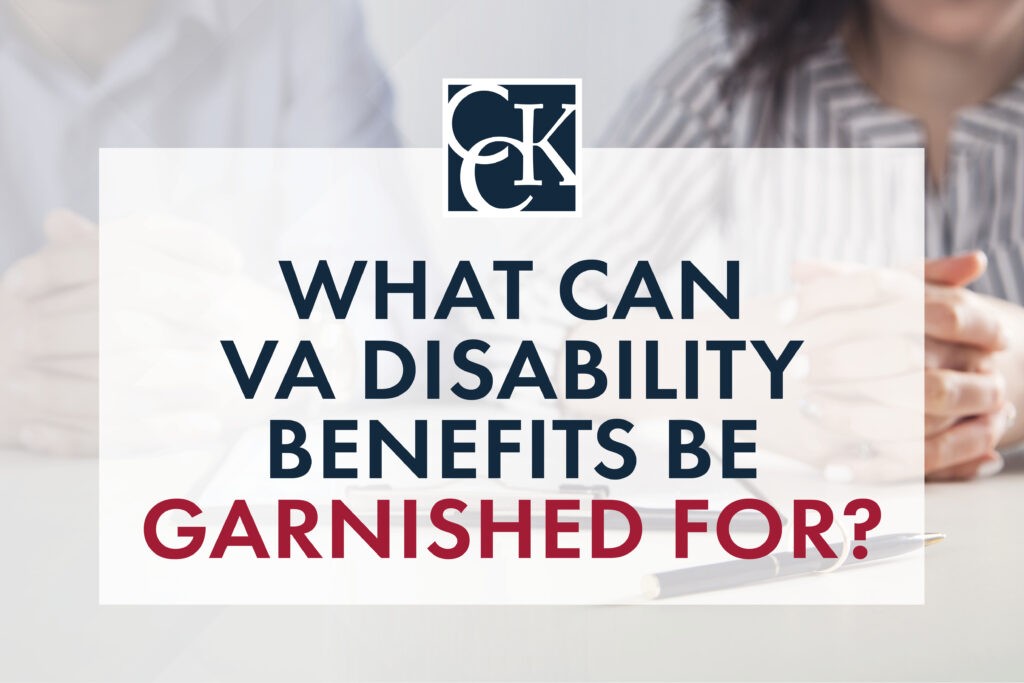What Can VA Disability Benefits Be Garnished For?

CCK Law: Our Vital Role in Veterans Law
Veterans are often concerned about how much of their VA disability compensation they may lose during and after a divorce, due to property division, alimony, and child support.
Each state has its own laws governing divorce, child support, and alimony. However, there are also federal laws governing the distribution of VA benefits and whether they can be garnished.
Importantly, these federal laws provide certain protections for veterans’ disability compensation and benefits.
What Does It Mean for VA Disability to Be Garnished?
According to the Department of Labor, garnishment is a legal procedure in which a person’s earnings are required by court order to be withheld for the payment of a debt. A person’s wages may be garnished for child support; monetary fines; unpaid taxes; defaulted student loans; and more.

Often, a third party will deduct payments directly from a debtor’s wage or bank account. Usually, the third party is the debtor’s employer or payment provider, and is referred to as the “garnishee.” The debtor may be entitled to relief if facing financial hardship.
What Can VA Disability Benefits Be Garnished for?
There are certain circumstances in which VA disability benefits can be garnished. These circumstances can include:
- Alimony Payments – If a veteran fails to make alimony payments, then their state may order their VA benefits to be garnished.
- Child Support Payments – Similarly, if a veteran fails to make child support payments, then their VA benefits can be garnished.
Who May Have Their VA Disability Benefits Garnished?
Garnishment typically depends on the veteran’s military retirement pay status. Generally, VA disability benefits can only be garnished if the individual who is receiving those benefits has waived military retired pay to obtain VA compensation.
In this case, only the amount of disability compensation that was paid in place of the military retired pay can be garnished. The remainder of the disability compensation is protected. If a veteran has not waived their military retired pay, then VA benefits cannot be garnished at all.
What Factors Affect How a Veteran’s Disability Compensation Will Be Garnished?
VA will decide the amount of disability compensation that can be reasonably garnished. This analysis will consider the following factors:
- Whether the veteran has other sources of income (if VA disability compensation is the veteran’s only source of income — credit debts, medical debts, student loans, and taxes cannot be garnished);
- Any special needs the veteran has that require a higher income to accommodate;
- The amount of income that is available to the veteran’s former spouse; and
- Any special needs the veteran’s former spouse and children not in their custody have that require extra funds.
How Much of a Veteran’s Disability Benefits Can Be Garnished?
Typically, between 20 to 50 percent of VA disability benefits can be garnished. This is because 20 percent is considered an insufficient amount for a veteran’s dependents. Likewise, 50 percent is likely to cause undue hardship on a veteran.
If the veteran has multiple children to support, then equal payments will be provided to each child out of garnishment.
Outside of the military retired pay status criteria, garnishment is not permitted when:
- Garnishment would cause undue financial hardship;
- A veteran’s former spouse or child has not filed for apportionment (see below);
- A veteran’s former spouse is living with another person and acting like they are married to that person; and
- A former spouse was found by a state court to have been guilty of conjugal infidelity (i.e., cheating).
How Will VA Disability Garnishment Take Place?
If a veteran’s disability compensation is subject to garnishment, then VA will operate according to 5 CFR § 581.103. In these cases, a Finance Officer and the Veterans Service Center (VSC) work collaboratively to withhold disability compensation and make a payment in compliance with the garnishment order for certain categories of payees.
Upon receipt of any court garnishment order involving a veteran who receives VA disability compensation in lieu of military retired pay (as described above), the Regional Office will deliver a copy of the court order to the local Finance Officer.
The Financial Officer will review the veteran’s claims folder to determine the appropriate withholdings and then notify the veteran of the pending garnishment action.
Furthermore, the Financial Officer should provide the veteran with a copy of the garnishment order, a description of the garnishment process, and information about monthly garnishment limitations and decision review rights. The VSC can then begin the process of withholding.
What If the Veteran’s Amount of Disability Compensation Changes?
If VA is garnishing a veteran’s disability compensation, and the amount of disability compensation or military retired pay to which the veteran is entitled changes (for reasons other than a cost-of-living adjustment), the VSC should review the veteran’s claims folder to determine if action to adjust the garnishment.
Getting Help Appealing for Increased VA Disability Benefits
If you have previously been denied an increased rating for your condition, an accredited VA disability lawyer may be able to help you with your appeal. The team at Chisholm Chisholm & Kilpatrick has decades of collective experience helping veterans secure increased ratings for their disabilities and we may be able to help you. Call our office today at (800) 544-9144 for a free case evaluation.
About the Author
Share this Post
